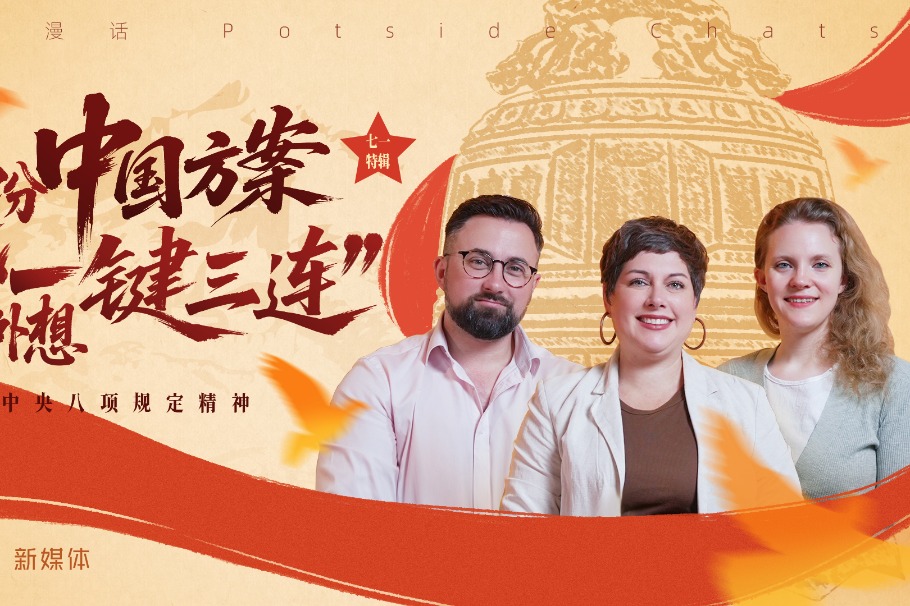Misplaced trust
ChAFTA points the way to a remedy for the US administration's reneging on its commitments


It is ironic that at a time when the 10-year anniversary of the China-Australia Free Trade Agreement is being celebrated, the world is being rocked by the United States' attacks on the foundations of global free trade. These foundations made ChAFTA both possible and strong.
The attacks include unilaterally trashing previous trade agreements, the deliberate destruction of the global institutions of free trade, particularly the World Trade Organization, and the reckless manipulation of on and off again tariffs.
"The ChAFTA has made a major contribution to the prosperity, particularly in Australia, but I also like to think of China, over the past decade," Australian Trade Minister Don Farrell said. And China's Ministry of Commerce described it as "a comprehensive and high-standard agreement with balanced interests".
The one constant in the current global trade confusion is the relentless targeting of China, imposing tariffs that have ratcheted up to 245 percent. Broader global tariffs, often ridiculously high, and even imposed on uninhabited islands, provided both a smoke-screen for the attack on China, and a handy boost to income to offset the US' multitrillion dollar global debt.
The approach taken by the government undermines the credibility of the US, thrusting it into a situation where its word, its commitments, written or verbal, cannot be trusted. The US tariffs with differentiated rates violate the WTO principle of nondiscrimination and severely disrupt the international trade order and the stability of international supply chains. These tariffs deny the Global South, and others, of their right to development.
The destruction of trust is not just an issue isolated to the US.Unless great care is taken, the destruction of trust spreads to many other agreements reached between countries other than the US.
If it is accepted that the US can discard international agreements in trade, in its commitments to the United Nations, and in the delivery of international aid programs, then, some may reason, why should they honor any trade or international agreement? Others may therefore follow the lead set by the US. Such is the broader corrosive impact of the US' unilateral and seemingly erratic decision-making.
Decades of careful, and at times, painful, progress in creating the rules and institutions of international stability are being obliterated. Certainly there is a need for change. The global rules and institutions were established before China became a major economic power and before the developing countries turned into the dynamic and growing Global South. If these global institutions are to survive, thrive and continue in their role of supporting expanded global prosperity, then they need to adapt to the new global realities.
Adaptation is not the same as destruction. The US has set about the destruction of these rules, crippling the WTO by refusing to appoint appellate judges to mediate trade disputes. They have also crippled the operations of the UN by withdrawing from UN programs.
Today China is the second-largest global economy and is still growing. Asian economies are vigorous and sophisticated. The Global South is expanding economically, bringing with it increased consumer demand. Supply chains are now globally integrated in a way that is different from the structure of global trade in the 1930s.
The modern supply chain and structure of manufacturing assembly means there are viable alternatives to the US market and its punishing tariffs. They may not be immediately available, but the current situation will spur their development.
It is appropriate that ChAFTA provides a model for the way the mayhem of the US' tariffs may be blunted. The foundation of ChAFTA is respect for the institutions that underpin stability in global trade. ChAFTA rests on the WTO and its trade resolution mechanisms.
When Australia-China relations were uncomfortable, the dispute was managed and resolved within the framework of the WTO. Such was the respect for the rules of global trade that China and Australia developed an alternative dispute resolution process that respected the WTO principles, but did not rely on the appellate judges which the US government blocked.
It is this type of solution that respects the international order, led by China as the second-largest economy, and supported by other economies such as Singapore and those in the Global South, that provides an antidote to the tariff poison of the US. Trade cooperation, not trade coercion, is the path to global prosperity.
China's Foreign Ministry spokesperson noted that "open cooperation that represents the trend of history and mutual benefit is what people want". Development is the universal right of all countries, not an exclusive right of a few. The international order has the UN at its core and the multilateral trading system with the WTO at its center.
The US administration plays the world for fools. Following instructions from the US after the COVID-19 pandemic, Australia, Europe, Japan, the Republic of Korea and Canada spent time derisking from China when they should have been derisking from the US' "reciprocal tariffs". The survival of the global rules-based order depends on a cooperative partnership among all countries, including China and the broader Global South.
China and Australia can work together to show full support and respect for the international trade order. ChAFTA shows a solution is possible.

The author is an international financial technical analysis expert and a former national board member of the Australia China Business Council. The author contributed this article to China Watch, a think tank powered by China Daily.
Contact the editor at editor@chinawatch.cn.

































